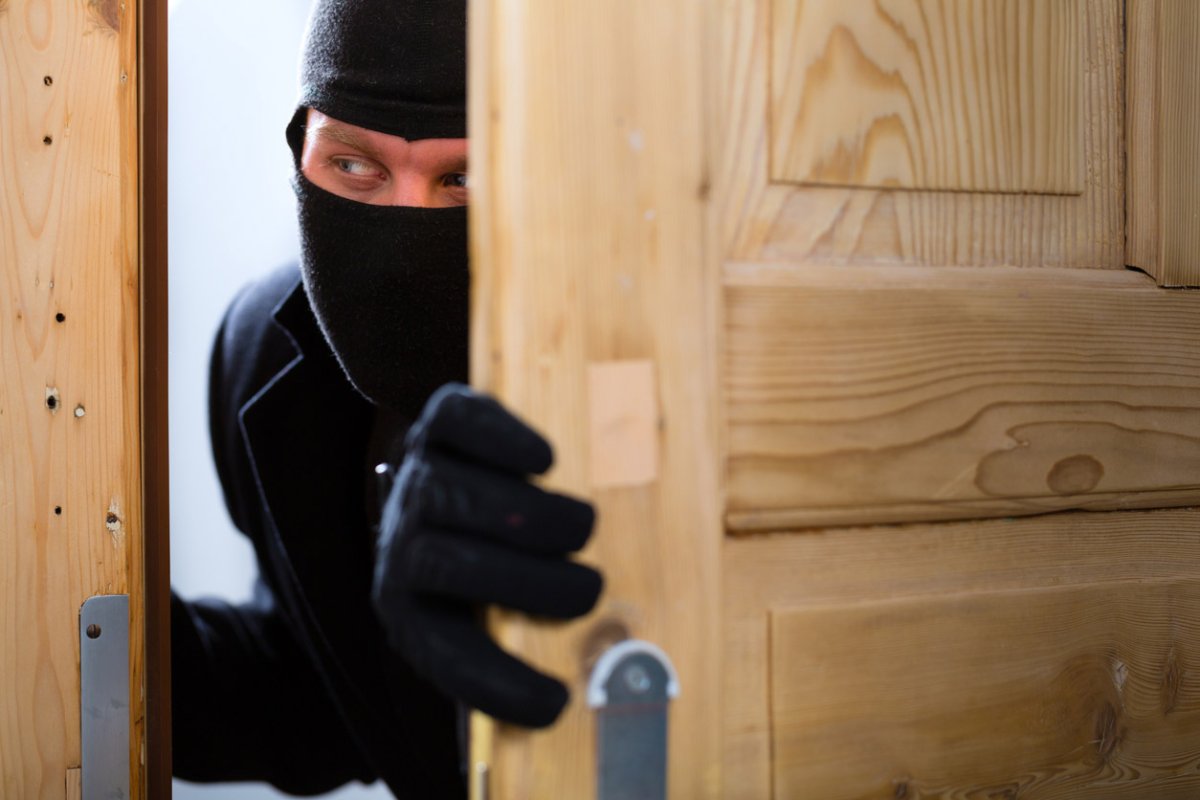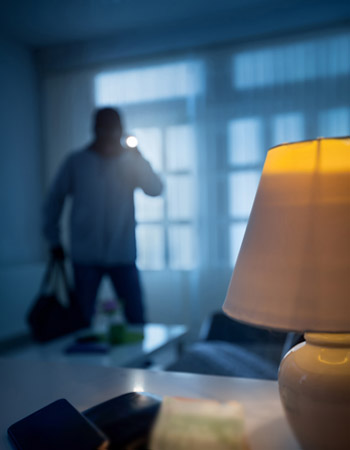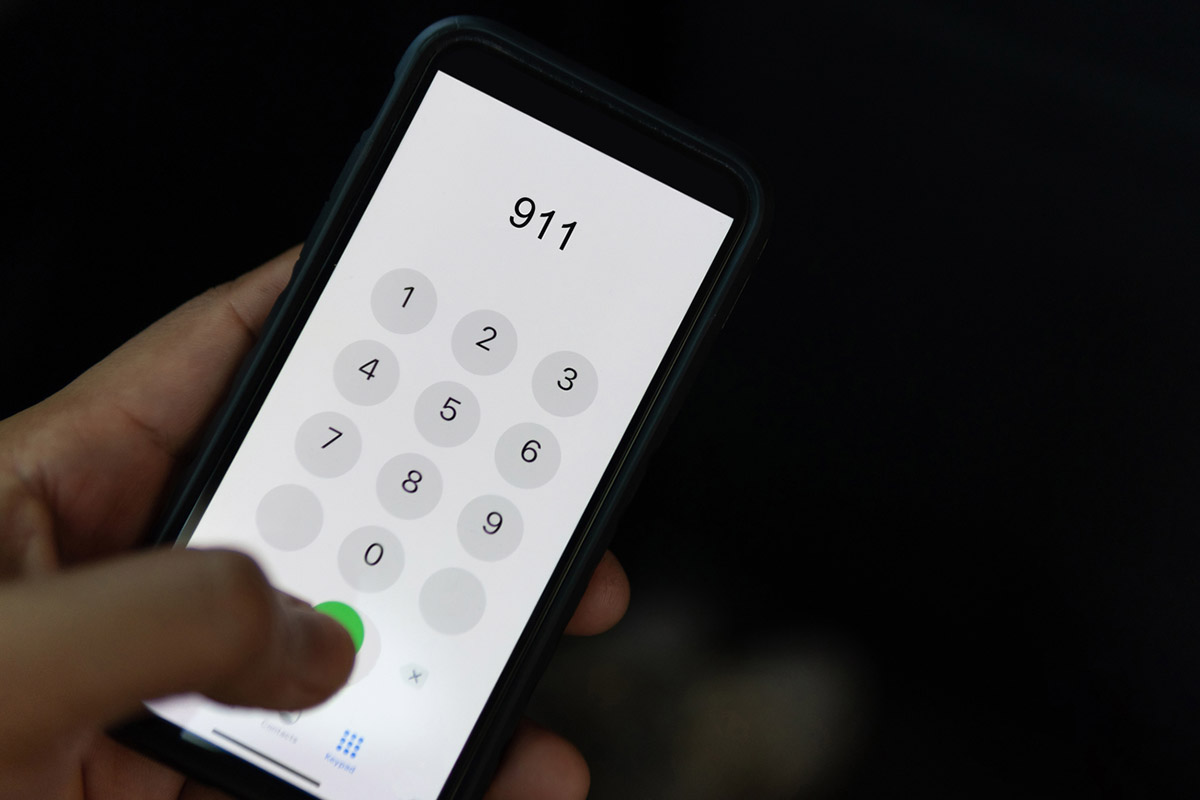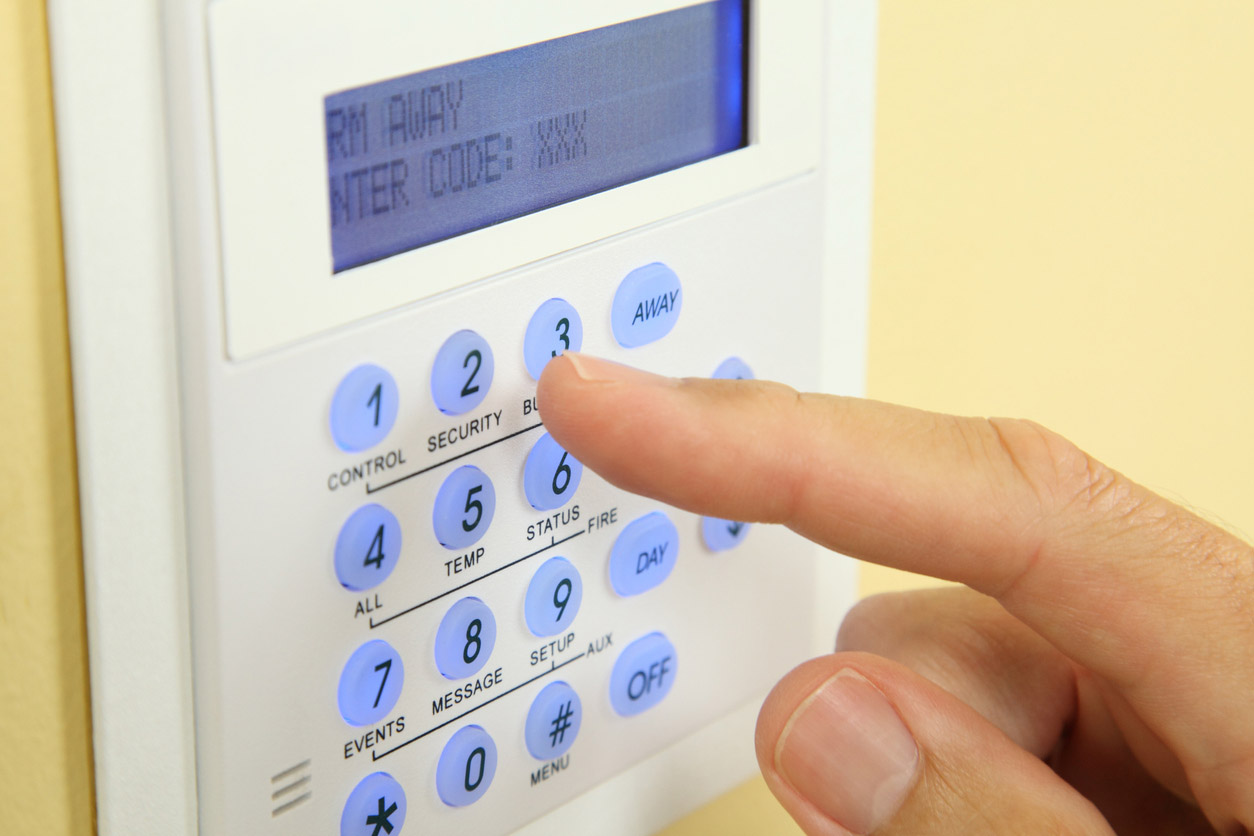

We may earn revenue from the products available on this page and participate in affiliate programs. Learn More ›
Break-ins are a violation of one of our most sacred and personal spaces: our homes. A criminal breaking into an empty home is a concern, but the threat of a home invasion when the residents are at home is what keeps many people awake at night. While many homeowners fear an overnight break-in, FBI statistics show that most home invasions occur during the day, so chances of someone breaking into your house at night are actually quite slim. Very little will stop a really determined burglar, but having a plan in place and a few minutes to execute it makes a positive outcome more likely. Thinking ahead, as difficult as it may be, can save precious time when deciding what to do if someone breaks into your house.
Burglars can be creative, and situations can shift unexpectedly during a crime, so there’s no way to map out exact plans for every eventuality. Planning home defense tactics isn’t as simple as fire safety planning, for example, where residents can choose which exit they’ll use depending on the location of the fire, because home invasions do not follow a predictable path. Plans for a break-in response need to be simple and flexible so that they can be quickly implemented in a variety of situations. Layers of preparation and planning can provide some peace of mind.
Tips for What to Do if Someone Breaks Into Your House

- Invest in preventive measures to protect your home from break-ins, such as upgraded security at entry points, lighting, and professional home security systems with monitoring to make the home less appealing and less accessible to burglars. There are also plenty of free ways to keep thieves away from your home without expensive equipment. If potential burglars hit roadblocks as they attempt to gain entry, you may be calling police to investigate an attempted invasion rather than an actual one.
- Have a plan in place that your family is familiar with to reduce panic and lost time.
- Remember that the vast majority of home invaders are chasing easy-to-sell valuables and aren’t there with the intent of harming residents. According to the FBI, most burglars don’t intentionally choose targets when residents are home, so they’re surprised to discover people in the house. Don’t panic, and follow the plan.
- If you come home to a broken window, evidence of lock bumping, or another sign that someone has broken in, don’t search the home yourself. Call the police and do not enter until they give the all-clear.
Safety Considerations
- Don’t try to confront a home intruder instead of calling the police, regardless of how confident you are that you can prevail. Call the police and secure the home’s residents in a safe space. Physical confrontation should be a last resort.
- Do not attempt to chase a burglar or would-be burglar after they have left the home.
- Making a plan can be emotionally difficult, especially for families with children. It’s a good idea to keep the outline of the plan simple for younger household members so as not to create unnecessary fear or trauma.
Protect your home and family with a top-notch security system. Vivint’s professionally installed systems don’t just alert you to threats—they help both prevent and deter them. See Vivint’s cameras and services.
STEP 1: Protect your home by making it less appealing to potential burglars.
The best and easiest thing to do is to eliminate anything that might make the home a target. “Prevention is invaluable,” says Katie Krueger, content marketing manager and home security expert at Deep Sentinel. “Give burglars every reason to say ‘not this house’.” There are several items that might entice a burglar to enter a home: a large TV box on the curb indicates that there is something valuable to steal inside. An overflowing mailbox is a sure sign that the home’s residents are out of town and the house is empty, and a home with lots of shrubbery and no outdoor lighting provides perfect cover for prowlers. Be aware of these home security tips, and make adjustments where necessary.
Wondering how to prevent a home invasion? This is a case where the best defense is a good offense. A study at the University of North Carolina that examined the actions and motivations of burglars showed that 83 percent of burglars check for a security system before they break into houses, and that 60 percent will find another target if they see one. Krueger agrees: “More than half of burglars will move on if they notice a security system in a home,” she explains. “Deep Sentinel’s home security cameras offer AI threat detection, which analyzes suspicious behavior in real time and streams it to live security agents.” Security systems from other companies often have similar features designed to help a home’s residents quickly and efficiently when they need assistance.
Not everyone wants to invest in a home security system, but taking steps such as adding exterior lighting; upgrading exterior doors, windows, and locks; installing window coverings that block valuables from view; and even adding faux home security cameras could make potential burglars more likely to move on. While it may seem obvious, the simplest way to keep a home secure is to keep the door locked when nobody is home, even if it’s only for a few minutes. It’s also a good idea to change the locks when moving into a new home or after a recent break-in.
“Crime prevention through environmental design (CPTED) is a philosophy that encourages the use of deliberate design elements to prevent criminal behavior,” explains Krueger. “CPTED involves steps like increasing your home’s visibility with outdoor lighting and clear sight lines, creating a clear perimeter around your private space with fences or other barriers, and maintaining your property to reinforce that it’s yours and that you will care for and defend it.”
STEP 2: Make an emergency plan and communicate it to your family.
“Creating a plan is crucial to securing your home and family,” explains Krueger. “That way, everyone will feel prepared and know what to do when disaster strikes.” Having a plan in place that the whole family is already aware of can be a valuable time-saver in the event of an emergency. This can include identifying all possible exits from the home and designating a meeting spot or safe space. It may also be a good idea to assign roles to each family member: i.e., person A makes the call to 911 while person B gets any small children to safety. Be sure to account for a few different possibilities such as family members getting separated or meeting spots or exits being compromised. This may also be a good time to come up with a daily routine of arming an alarm system and checking that doors and windows are closed and locked for the night.
Residents might be nervous about communicating their emergency plan to their children, especially if they are very young; however, it’s important that everyone in the home understand the plan and what their role is to be. According to Krueger, “A good plan is created with the help of all of those involved, including children. Hold a family meeting to discuss what each of you will do in an emergency. Set up a meetup spot, such as your neighbor’s home or a local park. Designate a neighbor or relative to be your emergency contact. Help your children memorize important information like phone numbers and your home address. Learn the layout of your home and make sure everyone knows the ideal escape route from their bedroom or wherever they spend time. You could even run a practice evacuation drill. With ample preparation, your family members are less likely to panic and put themselves in danger during a break-in.”

STEP 3: Have a code word that your family will know about.
A code word known to everyone in the house can work similarly to a fire alarm. Military experts in home defense tactical operations suggest simple phrases such as “ESCAPE” or “GET TO SAFETY” to alert the home’s residents that it’s time to enact the safety plan. These experts emphasize the fact that the phrase should not be cutesy or used as a joke—it should only ever be used in an actual emergency.
STEP 4: Designate a room in the house as your safe room, and make sure the room has a phone and a heavy piece of furniture.
The next step in developing an action plan for home invasion safety is to choose a room where the family can protect itself. In some cases it is ideal to escape the home. However, that’s not always possible and isn’t necessarily a good idea, as it can separate the residents or expose them to harm, so it’s a good idea to have a room where the residents can protect themselves. The best choice is a room with a strong door and door lock, a window that can be used for egress, and a heavy piece of furniture that can be shifted to barricade the door. It is also important that this room has a telephone so that the residents of the home can call the police and remain on the line as soon as the home is secured. Residents shouldn’t count on having their cell phone handy since they might have dropped it in the panic of getting to the safe room and be unable to call for help. A handset in a charger or an extra cell phone that stays plugged in and charged is a better plan.
STEP 5: Quickly determine whether escape is an option, and get out of the house as soon as possible if it is.
“In the event of a burglary or home invasion, don’t panic,” says Krueger. “Try your best to think with a clear mind in order to make smart decisions and stay safe.”
Getting all residents away from the home is the ideal scenario in the event of a break-in. If it is clear what part of the home the burglar is in, find an exit that does not cross their path. This may be a back door, a window, or a fire escape. “If you’re inside during a break-in, get out of the house immediately through the nearest door or window,” recommends Krueger. “It’s critical to escape if at all possible in case the intruders have weapons.”
If it is not possible to pinpoint the burglar’s location, residents will want to make sure the coast is clear before making any moves. If cell phones and car keys are easily accessible, residents can grab them before leaving. All members of the household will need to use extreme caution when exiting from a window on an upper floor to ensure they are not at risk of falling and sustaining an injury.
STEP 6: If escape is not possible, act quickly and gather in the safe room.
Should a home invasion occur, the residents of the home will need to act quickly. If possible, take a moment to listen and make a good guess about where the intruders are and where they’re moving. Using the code word should trigger everyone in the home to swiftly and quietly move to the designated safe room without drawing attention to themselves. If the home is equipped with smart speakers or home assistants, residents can program the receivers to recognize the safe word and automatically dial the police. “If escaping is not an option, hide,” says Krueger. “Get to a room with a locking door and barricade yourself in with heavy furniture until everything is safe.”
Rob Gabriele, managing editor and home security expert at SafeHome.org, agrees. “[If] there’s a way out of the home—like through a back door—then this is the best move,” he advises. “Call the police immediately once you’ve removed yourself from the threat.”

STEP 7: Call 911, and do not leave the safe room until the police arrive.
Once everyone is secured in the safe room, call 911 for help. Follow the instructions of the dispatcher and remain on the line. Remain in the safe room until the police arrive. It is important to note that silence on the other side of the door does not mean the intruders have left, so wait until the dispatcher on the line confirms that the scene is clear and an officer has reached the door. Then it is safe to exit.
“Whether the intruder is still inside or left long ago, call the authorities,” advises Krueger. “Give your address and describe your situation in as much detail as possible. Be prepared to stay on the line, especially if the crime is still in progress. Even if you think the intruder is gone, it’s best to stay outside of your home until the police arrive.”
STEP 8: Cooperate with the intruder and avoid confrontation.
Ideally, the previous steps will prevent any interaction directly with the intruder—this would be a best-case scenario for everyone. However, sometimes regardless of preparation and precaution, homeowners find themselves face-to-face with the intruder. At this point, an adrenaline rush may make it feel like the best plan is to start fighting, but an intruder unexpectedly confronted with a resident may panic and behave unpredictably or violently. This is not a time to be a hero.
“To protect yourself and your family from harm, it’s wisest to avoid confrontation,” advises Krueger. “Cooperate quietly and politely. Hand over anything you are asked for. Don’t make physical or verbal threats. Wait until the coast is clear before calling the police.”
If at all possible, allow the intruder to take whatever belongings and valuables they came for and leave, at which time it is safe to call the police and begin a report. Regardless of how valuable and irreplaceable the items may seem, they are not worth residents risking their safety. Avoid staring at the intruder, and follow any instructions that are given as best as possible to avoid further escalating the situation. The moment may come when confrontation is unavoidable, but the resident will know they’ve done everything possible to avoid it.
“In any situation where an assailant might carry a weapon, including a burglary, use the ‘run, hide, fight’ method,” says Krueger. “Your first priority is to run away. Your second best option is to hide. Your absolute last resort is to fight back. Arm yourself with a baseball bat, a licensed firearm, or whatever you have access to. You have every right to defend yourself from harm.”

STEP 9: Contact your homeowners or renters insurance provider to file a theft claim if necessary.
After the incident is over, the relief that everyone is safe may be directly followed by the stark reality of what has happened. In addition to the emotional toll that this kind of event can take on a family, there may also be physical and financial ramifications to deal with. Items of significant material or sentimental value may have been taken. The home may have also sustained damage, such as a door that has been kicked in or a broken window. Thankfully, homeowners and renters insurance typically covers costs associated with burglary less the deductible. This may include the value of the items that were stolen as well as the repair of any damage from the break-in. The exact type and amount of coverage you receive will depend on your specific policy. Before filing a claim, be sure to gather evidence of the burglary by taking photos of any damage, making a list of everything that will need to be repaired and replaced, and reporting the crime to the authorities as soon as possible.
A Note of Caution
These steps should help homeowners formulate a plan to prepare for and act calmly during what may be one of the most stressful and frightening events of their lives. They reflect the current best practices advised by home defense tactical experts. Home invaders are by nature reckless and unpredictable, so there’s no way to guarantee a good outcome. Sometimes despite the best efforts, a home invasion can result in property loss and personal injury. Following these steps as recommended by law enforcement and defense experts will help residents stay calm and give them the best opportunity to make smart choices toward a positive outcome, and they should give residents some peace of mind.
An excellent way to get peace of mind can be for residents to install one of the best home security systems (such as Vivint, Simplisafe, Frontpoint, and ADT) to protect their home. Technology is advancing rapidly with home security companies offering features like various types of window alarm sensors, doorbell cameras, advanced types of door locks, motion-activated lights, or 24/7 professional monitoring. Whether a resident needs one of the best apartment security systems or a home security system for a large suburban house, there are options on the market to meet their needs, budget, and desired level of security.
